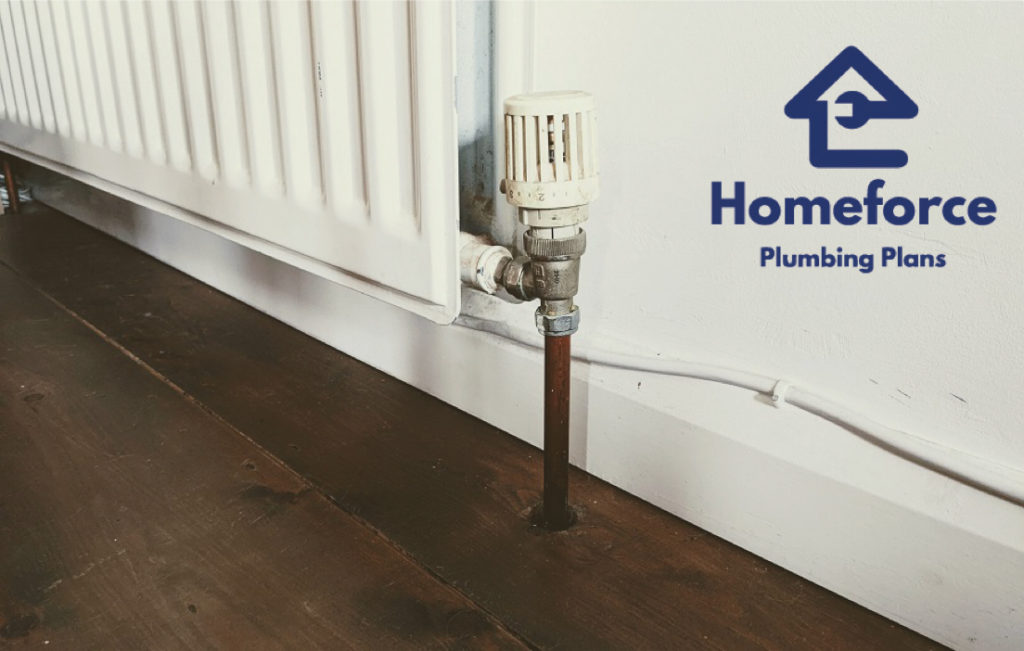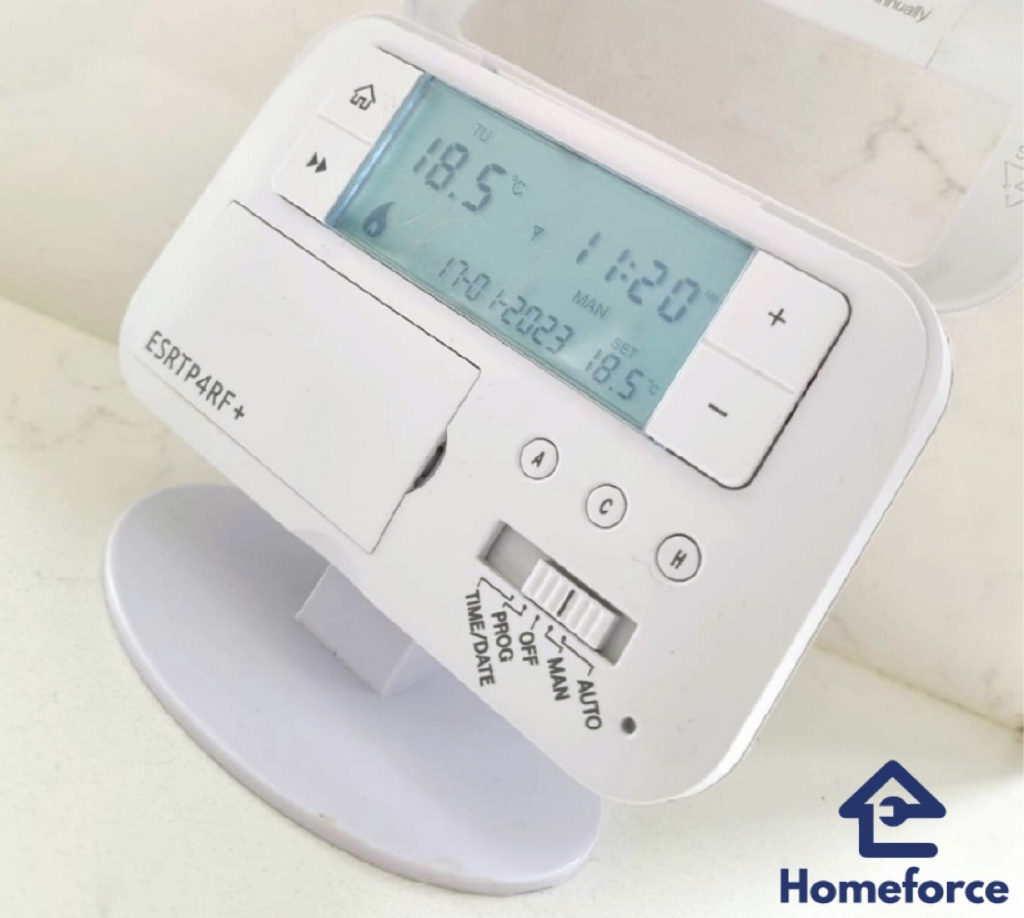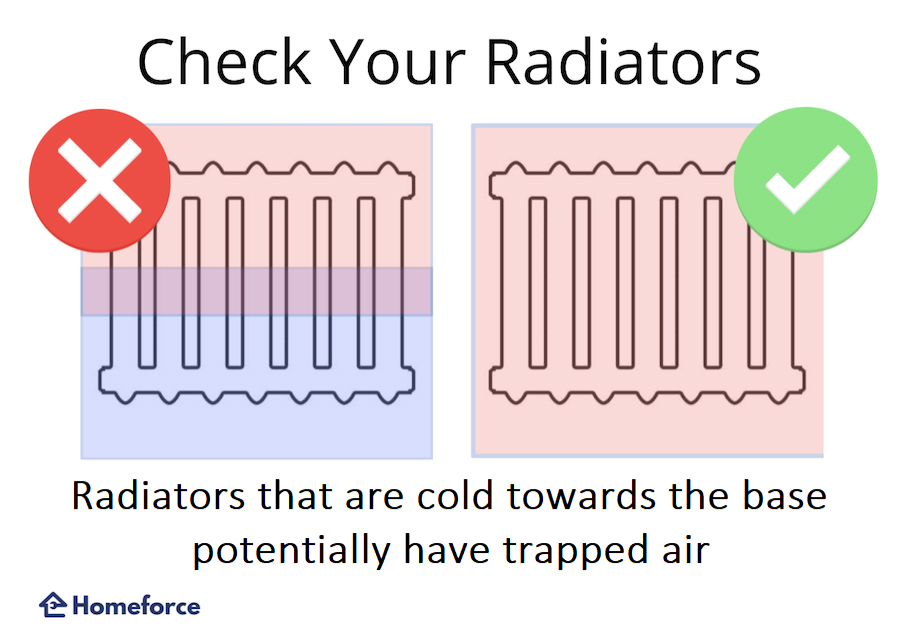Written On
Tue 17th January 2023
Written By
Homeforce
Category
Guides
Share This
More than three-quarters of UK residents use gas central heating to keep warm during the winter, according to research conducted by the Department for Business Energy & Industrial Strategy (BEIS).
However, it can be extremely frustrating, especially during the colder months when you’re trying to keep your home warm and comfortable when your radiators are cold and don’t seem to be working properly.
Many of our customers here at Homeforce ask us why their radiators might be cold and how to fix the problem.
So, we thought we would put together a blog post explaining the main reasons why your radiators could be cold and offering some tips on how you can fix the issue.
Before we get into the details, here’s a quick sum up.
Generally, the main reason why radiators are cold is that there isn’t enough hot water flowing through them. This could be due to a build-up of sludge in your system, incorrect bleeding of your radiators, wrong size radiator, a broken thermostat or a problem with your boiler or other reasons.
Here’s a quick reference table as a fast troubleshooting guide. Check the list to find your issue and then consult the more detailed information lower down.
| My Radiator is Cold – Cause | My Radiator is Cold – Solution |
| 1. Insufficient hot water flowing through | Bleed radiators, potentially flush the system. Adjust flow rate on boiler |
| 2. Radiator Valves do not open all the way | Turn the radiator valve to a more open position and monitor the situation |
| 3. Boiler not working properly | Could be a number of issues, contact us for more advice |
| 4. Bleeding your radiators | Bleed the air from your radiators. If the problem persists then refer to number 1 above for further actions |
| 5. Check your thermostat | Check thermostat is on and set to the correct temperature |
| 6. Check for radiator leaks | Check the leak size by capturing the water. Small leaks can be repaired with radiator sealant. Large repairs usually require a professional |
| 7. Check for sludge | Water may appear brown when bleeding radiators, if the problem persists, then the entire system may need to be flushed |
| 8. Wrong-sized radiator | Call on a professional to assess radiator size and system capabilities |
| 9. A build-up of limescale | Radiators will need to be de lime scaled to free up the flow in the pipes |
Now, consult the list below for more information and advice on why this is happening and what you can do about it. Or simply call us to discuss getting it fixed.
My radiators are cold!
Now that we’ve provided an overview, let’s take a closer look at each of these reasons in turn…
1. Insufficient hot water flowing through the radiator
If there isn’t enough hot water flowing through your radiators, they will naturally be cold to the touch.
This is the most common cause of cold radiators and is often down to a build-up of sludge or air in your system.
To fix this, you’ll need to bleed your radiators to get rid of any trapped air and potentially flush your system to remove any build-up of sludge. You may also need to adjust the flow rate on your boiler.
2. Radiator valves do not open all the way
If your radiator valves aren’t fully open, then hot water won’t be able to flow through the radiator properly and it will stay cold.
To fix this, simply turn the valve handle until it is fully open. You may need to use a spanner to loosen it first. Then monitor the heat over the next few days to see if the situation improves.

3. Boiler not working properly
If your boiler isn’t working properly, then it won’t be able to heat your home effectively and your radiators will stay cold.
There are several reasons why your boiler may not be working properly. It could be due to a build-up of limescale, a broken component or a problem with the gas supply.
If you think your boiler is the cause of your cold radiators, then you should contact a Gas Safe registered engineer for help.
This may also be the time to think about taking out a boiler plan so you can protect your family and your home from unforeseen extra monthly costs and emergency call-outs.
4. Bleeding your radiators
This is another common cause. Often, particularly during summer months, radiators have been turned off for some time. Air can seep into the system during the downtime which means the radiators may then need to be bled (this is where the air is removed from the system).
If your radiators are full of air, then they won’t be able to heat up properly and will feel cold to the touch.
To bleed your radiator, turn off the heating at the boiler and wait for the radiator to cool down. Once it’s cool, place a cloth or towel underneath the valve at the bottom of the radiator and slowly turn the valve until water starts to come out.
Once the water is running freely, turn the valve back to the closed position and turn the heating back on at the boiler. If the problem persists, then you may need to refer to option one for additional actions.
5. Check your thermostat
With many of these solutions, bleeding the radiators is often the first step before then looking at other issues.
If your radiators are still cold after bleeding them, then there may be something wrong with your thermostat.
First, check to see if the thermostat is turned on and set to the correct temperature. If it is, then you may need to replace any batteries or have a professional investigate the wiring.
If the batteries are fine, then it’s possible that the thermostat itself is broken and will need to be replaced.

6. Check for radiator leaks
If your radiators are leaking, then this can obviously cause them to become cold. Especially if the boiler is not replacing the lost water sufficiently.
To check for leaks, simply place a piece of cardboard or a towel underneath the radiator and see if it gets wet.
If the leak is small, then you may be able to repair it with a radiator sealant. However, if the leak is large or if you can’t seem to stop it, then you’ll need to get a new radiator.
7. Check for sludge
If your radiators have been cold for a while, then sludge may have built up in the system. Sludge is made up of rust, debris and scale, and it can prevent water from circulating properly.
You can usually tell if there’s sludge in the system if the water coming out of the bleed valve is black or brown.
If this is the case, then you’ll need to get a power flush to remove the sludge and get your system working properly again.
8. Wrong-sized radiator
There’s a balance to be made regarding the size of the boiler, the size and quantity of radiators that are running, and other factors. The sign for this (after bleeding the radiators) is usually one or two that appear to be the issue.
If you’ve recently had a new boiler fitted, or your home has been extended, then the radiators might not be the right size for the area, or too large or remote for the boiler system to sufficiently service it.
This can cause your radiators to be less effective, and they might not produce enough heat to warm up the room.
You’ll need to get someone in to check the sizing and see if they need to be replaced.
9. Build-up of limescale
If there’s a build-up of limescale in your radiators, then this can stop them from working properly.
Limescale is caused by hard water, and it can narrow the pipes, clog up the radiator and stop the hot water from circulating properly.
You’ll need to descale the radiators to remove the limescale and get them working again. You can buy descaling products from most supermarkets, or you can contact a professional to do it for you.
Other reasons my radiators are cold
So now we’ve found the top ten main causes of radiators being cold, you might be wondering why only parts of your radiator feel cold to the touch.

Read on to find out more.
Why is the top of the radiator cold?
The most probable reason a radiator is cold at the top has to do with trapped air. With water being about 900 times denser than air, if there’s even a small amount of pressure, the air will rise and float on top every time.
This means that once bubbles enter the system and reach an area with no escape route (such as the top of a radiator), they’ll stay put. And more bubbles simply mean more trapped air.
If there is trapped air in your radiator you should first try bleeding your radiator. This involves releasing the air through a valve at the top of the radiator. See one of our earlier solutions for the steps on how to do this.
Why is the bottom of the radiator cold?
The main issue with radiators being cold at the bottom is usually due to sludge.
Sludge is made up of corrosion products, radiator inhibitors and bits of metal that have come away from the radiator itself or the pipes.
Sludge prevents heat from being conducted properly through the radiator so it’s important to get rid of it. The easiest way to do this is to bleed your radiators.
Why is the middle of the radiator cold?
Similar to why the bottom of the radiator is cold, if the middle of the radiator feels cooler to the touch than the rest of it, then it could be a build-up of dirt and grime which will prevent heat from radiating properly around the entire unit.
Why is only one radiator cold?
There could be a few reasons why only one radiator is cold. Firstly, check that the radiator valves are open – if they are closed then no water will flow through the radiator and it will stay cold.
If the valves are open then there may be an issue with the water flowing through the radiator, which could be due to a blockage or a problem with the pump.
Alternatively, there may be an issue with the boiler itself – if it’s not generating enough heat one, a few, or all the radiators could be affected. If you’re not sure what the problem is, it’s best to call a heating engineer to take a look.
My radiators are cold – Finishing up…
These are the main reasons why your radiators might be cold. Often it can seem like numerous issues are occurring and it’s hard to pin down the main cause.
So if you’re still having problems, then you should contact a professional heating engineer to take a look and see if there’s anything else that could be causing the problem.
Heating systems, and boilers especially, do have their risks when it comes to repairs as you’re dealing with water, electricity and heat.
Here at Homeforce, our qualified heating engineers will be able to diagnose the issue and carry out any necessary repairs to get your heating working properly again.
We understand how frustrating it can be when your radiators are cold, so we’ll do everything we can to get them fixed as quickly as possible.
Contact one of our friendly and knowledgeable team members today.